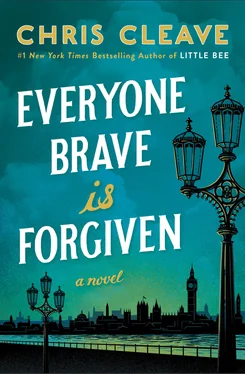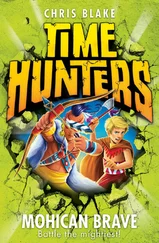Mary drank coffee, geeing up her third cup with a dozen drops of morphine. She managed half a scone. Her stomach was tight from sleeplessness, and the drug queered her appetite anyway. Across the dining room, a pianist was playing the “Blue Danube.” Mary watched the children eat everything on the table, beginning with what was nearest to them and finishing — when there was no more bread to spread it on — by licking the last of the butter from its dish. They passed it between them, without ceremony but with no imperfection of manners that Mary could detect. Zachary left a little extra for Molly, who was very small and frail. The girl laid her head on the perfect white tablecloth and fell asleep again, with her mouth open and her arms hanging vertically.
From their tables the other guests watched, over the tops of ironed newspapers. It would be minutes rather than hours, Mary realized, until the scene was relayed to Pimlico. With the morphine, it was possible to know that this was unfair on her mother, and also not to mind.
Zachary wiped his face on the tablecloth. “May I have a cigarette?”
“Not until you are thirteen. Tell me, do you like looking after Molly?”
“It’s all right.”
“You’re good with her.”
“I’m no good at anything.”
“Nonsense. You’re a fine musician and a champion paste eater.”
“Everyone should be able to read and write. You said it yourself.”
“I was wrong,” she said. “I have buried a man who could read, you see, killed by people who can write.”
She tried to light a cigarette, but the flame and the end of the cigarette wouldn’t converge. Zachary had to guide her wrist.
“Thank you,” he said.
“What for?”
“For coming to find me.”
She supposed she must have. And here she was, apparently, in the Ritz, with Negro orphans. Diners stared back at her, stiff with condemnation. And here she was — oh, here she still was, yes — even now, with no clear idea, just for the moment, of how one might have got here.
THE WIND PUSHED A raft of cloud over the island, and the bombing stopped for six days. Alistair rotated with the battery, back from the highlands to Fort St. Elmo. It was cooler by the sea, and the officers found a sharpness in themselves again. When the wind blew some Sicilian fishermen into Grand Harbour — their engine had thrown a piston — Alistair hatched a plan that Simonson liked enough to take to the lieutenant colonel.
The Sicilians were hauled up on the dock and invited in exchange for their lives to spit on a photograph of Mussolini. This done, they were treated to a feast. They had roast meats and fancy breads, a gramophone and brandy. The officers of the Royal Naval Dockyard, dressed in their parade-best uniforms and whistling airs from Gilbert and Sullivan, repaired the fishermen’s engine, not neglecting to fasten a portrait of the King to their cabin’s central bulkhead using star-headed brass screws that could not be undone except with a particular issue of Royal Navy screwdriver.
The work being finished and the wind falling calm, the combined brass bands of the various regiments defending Grand Harbour were assembled on the quayside in tropical dress, with folded blankets secreted beneath their tunics where their bellies ought to have been. They shouldered their tubas and played an extended medley of Vaughan Williams and Elgar while the fishermen were escorted back out through the harbor’s mine cordon by the polished mahogany launch of the Admiral of Her Majesty’s Mediterranean Fleet Andrew Browne Cunningham, the First Viscount Cunningham of Hyndhope, flying the white ensign. Thus the enemy’s fishermen carried home the intelligence that the island was doing very much better than the enemy had imagined, and ought not to be invaded just yet.
When the signals officer on the ramparts of Fort St. Elmo put down his binoculars and reported that the fishing boat had gone out of visual range, the brass bands were stood down. Officers and men folded their parade uniforms and put on the frayed and malodorous battle dress that they had lived in these many months. The admiral’s launch was returned to its mooring and covered with the stained tarpaulin that made it look, from the air, like any of the harbor’s little boats. Its tank was drained of diesel oil, which was needed for the electric generators in the forts. The admiral himself, who was on the same rations as the men, found that he could barely lift his arm to return the salute when his subordinate came to report that the operation had been a success.
The scraps of food that the fishermen had left were collected into a basket, covered with a cloth, and taken to the central stores to be allocated to one of the batches of soup that would be distributed to the starving garrisons.
“Well,” said Simonson, his feet up on Alistair’s metal desk, “you are not a handsome man, but I will admit that your plan went off well.”
“The men were magnificent, weren’t they?”
“I daresay they needed it. Nice to be the ones dishing it out for once.”
Alistair lurched, sat down on his cot and closed his eyes.
“All right?” said Simonson.
“Give me a moment. I’ll be fine.”
Simonson lit a cigarette, rocked back on his chair, and exhaled. “I don’t think you will be fine, Alistair.”
“No, I don’t suppose I will.”
“Do you think we might get that arm taken off for you now?”
“The surgeon still feels I can keep it.”
“We wouldn’t be keeping the surgeon if we had any choice. He is a sawbones and I’ll bet he learned medicine at the Army Veterinary College.”
“Then be glad he hasn’t put me down.”
“But he is killing you, isn’t he, in his way? Letting your arm fester like this? Look at you — it’s up to your shoulder.”
Alistair tried to think, through the nausea. “We haven’t had much luck, have we, with the men who’ve gone into his theater?”
“We’d get you a Navy surgeon. They’d pipe you aboard, whip the arm off, and send you away with rum. We’d just have to watch they didn’t issue you with a hook hand and a parrot — you know the Navy.”
Alistair cradled the arm. “I’m not sure.”
“Think of that girl of yours. She’d put you straight.”
“She still doesn’t write.”
“But I shall still have to write to her, if you die from this infection. You know how I hate writing those letters.”
“Drop it, won’t you? It makes me nervous when you’re tedious.”
“It makes me tedious when you’re dying. Be a good chap, won’t you, and get the arm taken off? Then I can have you evacuated. There’s an orderly queue of cripples and grotesques. As soon as your number comes to the top of it, they fly you home on the mail plane.”
“I’d rather stay and help.”
“You’re no help dead.”
The sirens sounded. Simonson stood wearily.
“Enjoy every moment,” said Alistair.
“Will you think about what I said, and let me have your answer?”
Alistair turned away, then nodded.
“Good man.” Simonson put on his cap and left, and the garrison crept back into its shell to take another beating.
Alistair looked out over the harbor. He heard the aircraft before he saw them. They came in as they always did, from the north, and he steadied his field glasses to watch them. They were Heinkels, lined up along the horizon with their fighter escort larking above. The RAF had nothing to put up against them and so there was nothing for the German fighters to do. Alistair imagined they practised aerobatics and scored the others’ maneuvers for aesthetics and technical difficulty, while far beneath them the grubby Heinkels laid their turds of high explosive.
Читать дальше












